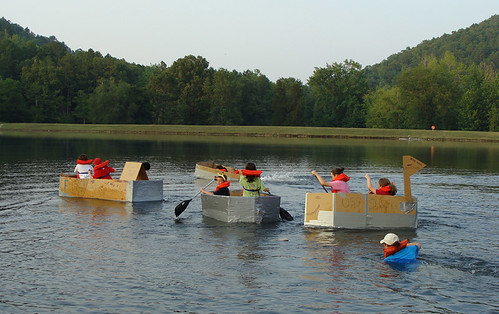Lessons of summer camp: resilience, camaraderie for children and parents
By KD Reep
U of A System Division of Agriculture
May 27, 2016
Fast facts
- The purpose of summer camps is to help children learn and mature.
- Preparing for summer camps is as much about the parents as the campers.
(563 words)
(Newsrooms: with art available at www.flickr.com/photos/uacescomm/4730421418 and www.flickr.com/photos/uacescomm/12708652065/ )
LITTLE ROCK – No matter the setting or subject matter, summer sleep-away camp offers lessons of self-reliance and confidence for both children -- and parents.
“The purpose of summer camp is for children to learn to make their own way in the world,” said Angie Blacklaw-Freel, 4H and Youth Development instructor with the University of Arkansas System Division of Agriculture. “Kids learn in a social setting at camp how to be self-reliant, make friends and get along with new people. Whatever else they learn – cheerleading, religion, horseback riding, etc. – is the commonality that gives campers a way to start conversations and establish relationships.”
When most adults think of summer camp, images from madcap 1970s and 1980s movies come to mind. However, summer camp for kids today helps them become more confident, calm and focused.
Key lessons
“Since campers live in groups, the kids learn about compromise, making decisions as a group and getting along with all the other campers they encounter when they arrive,” Freel said. “Kids are much more likely to be ready for camp than their parents are, and understandably so. However hard it can be to send your child off without you for any significant length of time, what the kids gain in return will last them the rest of their lives.”
Freel suggests parents keep a few things in mind when deciding to send a child to camp. First, if your child already has friends and is able to sleep away at a friend or grandparent’s home, he or she should be ready for summer camp.
Parental learnings
“As a parent, you don’t want to tell your child that you don't know how you will survive without him or her,” Freel said. “It’s fine to let your child know you will miss them, but feelings of guilt surface quickly if he or she thinks you will be miserable without them.”
Next, remind yourself that you have instilled in your child the ability to be independent, and summer camp is a way for him or her to exercise that.
“Entrusting your child to another person for an extended length of time takes a huge leap of faith on the parent’s part,” Freel said. “When you see your child return full of excitement and talking nonstop about his or her camp adventures, it will make it all worth it.”
The sendoff
Now that the parents are ready, Freel offers these tips in preparing children to attend summer camp. First, let them help you pick out the camp they would like to attend. When they have some buy-in, they feel more part of the process and less like they are being made to do something they may not want to do.
Next, include them when you shop and pack for camp, being sure to include a favorite item of theirs to take with them, like a stuffed animal or other toy. This will give them something familiar to use in case they feel homesick.
Finally, praise their talents and tell them how those assets will help them at camp. If they are shy, tell them how being a good listener will help them make new friends.
“Reinforcing their good qualities will remain with them regardless of any doubts they may have,” Freel said. “Rest assured your influence up until you sent them to camp remains with them as they navigate this new adventure.”
For more information on summer camps, visit 4-H Camps or contact your county extension office.
Pursuant to 7 CFR § 15.3, the University of Arkansas System Division of Agriculture offers all its Extension and Research programs and services (including employment) without regard to race, color, sex, national origin, religion, age, disability, marital or veteran status, genetic information, sexual preference, pregnancy or any other legally protected status, and is an equal opportunity institution.
# # #
Media Contact: Mary Hightower
Dir. of Communication Services
U of A Division of Agriculture
Cooperative Extension Service
(501) 671-2126
mhightower@uada.edu
Related Links
